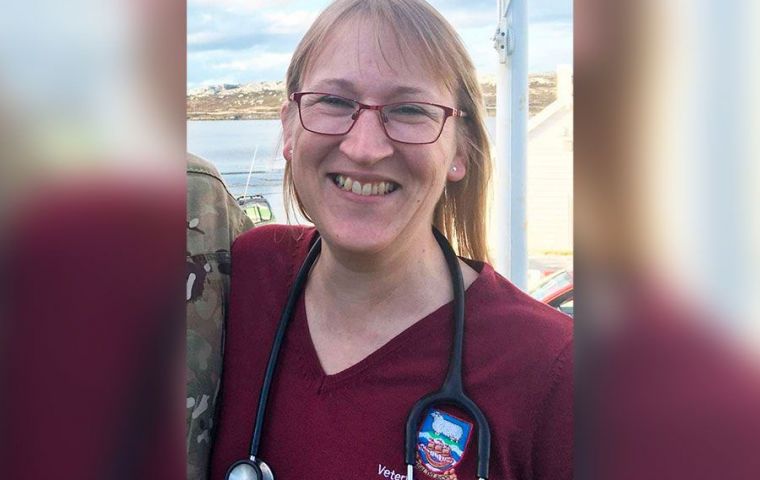MercoPress. South Atlantic News Agency
Falklands Senior Veterinary Officer recommendations on Avian Influenza
 Zoe Fowler, Falklands Senior Veterinary Officer
Zoe Fowler, Falklands Senior Veterinary Officer As we have learnt Avian Influenza is the current bird/poultry disease to look out for. Just to recap: Avian Influenza is a viral disease of birds (very seldom also humans), that is mainly transmitted via direct contact and/or droppings of infected birds. The symptoms can range from flu type symptoms (sneezing, respiratory distress) and decrease in the number of eggs laid, all the way to sudden death.
Today we would like to give a few pointers on how to keep your poultry as safe as possible in this risk period when migrating birds are starting to return:
1. The henhouse/run. With the knowledge that infection can spread via droppings, it is easy to imagine infected birds flying over your garden and leaving some uninvited droppings without even landing. We don’t want our chickens in contact with that, so what to do? The roof for your henhouse should be water tight and secure, so nothing can fall through. You may wish to apply the same precautions to your hen run at this stage too. To have the sides secured with netting or fencing is fine, but droppings can fall through the top, so try to create a cover to prevent that from happening. These precautions may become mandatory when and if we start getting suspect or confirmed cases of bird flu in the Falklands. To begin with start ensuring that your chickens stay in their designated area, instead of roaming unprotected through the garden (or more importantly don’t let them roam on the road or through your neighbors’ garden).
2. Now that we have our chickens secured in their own space, we want to make sure not to carry anything in to them ourselves. So, the number of people entering the run and interacting with the hens should be limited. Consider how you would go about keeping boots for hen feeding clean (find something you can use for a foot bath and get a dedicated brush) and think how you might dip them or spray them down with disinfectant before going in. Try not to use the same boots that you have been lots of other places in e.g. you may have walked over a beach with infected wildlife and have the virus on your soles.
3. Keep all feed and bedding for hens indoors to ensure that no wild animals (including rodents) have any access to it. Water should come from a clean tap preferably indoors. Now is the time to fix up any minor maintenance issues and perhaps deploy some rodent control.
4. Clean water and feeding bowls regularly and if nothing else now is the time to ensure wild birds cannot access your hens’ food and water (keep them in a well-covered area). If hens and ducks tend to live freely together around a ditch or pond it might be worth separating off the hens as natural water sources are a prime place for infection to spread as wild birds can share that resource.
5. Even if it’s not very likely, please don’t forget, that Avian Influenza is considered a zoonosis, meaning humans can get infected. So please avoid direct contact (cuddling of pet hens for example) and wash your hands after interacting with them.
These measures should help to keep our animals and also ourselves safe and healthy should bird flu arrive in the Falklands. It is well worth thinking about protective measures now. If you have any questions or concerns please do not hesitate to contact the Veterinary Department.


Top Comments
Disclaimer & comment rulesCommenting for this story is now closed.
If you have a Facebook account, become a fan and comment on our Facebook Page!